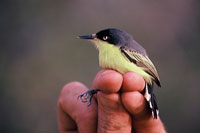About
Previous work
Dr. David Anthony Kirk, Consultant Lead at Aquila Conservation & Environment Consulting, has 25 years of expertise in ecological research and biodiversity conservation. He and his colleagues have two main areas of focus:
1) Providing a science-based foundation for the conservation of biodiversity in  human-disturbed landscapes.
human-disturbed landscapes.
Specifically, this involves research on the effects of farming, forestry and energy sector development on biodiversity through multivariate modelling of the distribution and abundance of organisms (plants, invertebrates, birds and mammals). This type of research helps develop policies for managing and restoring landscapes, and guides implementation of ecologically sustainable land-use practices and conservation planning for protected area networks.
2) Reviewing the status and assessment of populations of all species and species at risk.
To date, we have prepared inter alia: nearly 20 status reports (full reports and updates) for the Committee on the Status of Endangered Wildlife in Canada (COSEWIC); six draft or proposed recovery plans for species at risk teams; two draft action plans; a management plan for the Yellow-breasted Chat virens subspecies; a review of sampling designs and protocols for monitoring rare species; and a review of species distribution modelling techniques aimed at identifying critical habitat for rare species.
 Aquila Conservation & Environment Consulting has solid experience with, and understanding of, recovery and management of species populations. Specifically, we have strong skills in assessing the effects of forestry and agricultural practices on biodiversity. Part of this process involves investigating the influence of landscape configuration, habitat area and human disturbance on the distribution and abundance of plants and animals. We have reviewed multiple approaches to the selection and use of indicators. We have also assessed various environmental scenarios and their implications for biodiversity and human well-being.
Aquila Conservation & Environment Consulting has solid experience with, and understanding of, recovery and management of species populations. Specifically, we have strong skills in assessing the effects of forestry and agricultural practices on biodiversity. Part of this process involves investigating the influence of landscape configuration, habitat area and human disturbance on the distribution and abundance of plants and animals. We have reviewed multiple approaches to the selection and use of indicators. We have also assessed various environmental scenarios and their implications for biodiversity and human well-being.
All rights reserved. All images used on this website are property of Aquila
Conservation & Environment Consulting and may not be used without permission.